The UAE lottery Halal or Haram? Shariah Perspective Guide
Lotteries are popular worldwide, offering participants the chance to win substantial cash prizes in exchange for buying tickets. The UAE, a country known for its Islamic principles, also hosts various lotteries, such as raffle draws and promotions tied to shopping festivals or special events.
But for Muslims seeking to follow Islamic teachings, an important question arises: Is participating in the UAE lottery Halal or Haram?

This article explores the topic from an Islamic perspective, considering the principles of Sharia law, scholarly opinions, and the distinction between permissible and impermissible forms of wealth acquisition.
Understanding Islamic Teachings on Gambling
In Islam, gambling (known as maysir or qimar) is strictly prohibited. The Quran explicitly forbids it in several verses:
Read also The UAE Lottery Is It Real or Fake?
“O you who have believed, indeed, intoxicants, gambling, [sacrificing on] stone alters [to other than Allah], and divining arrows are but defilement from the work of Satan, so avoid it that you may be successful.”
(Surah Al-Ma’idah 5:90)
The core reasons behind this prohibition include:
- Uncertainty (Gharar): Gambling involves an element of uncertainty, where participants risk money without guaranteed returns.
- Exploitation: It often results in one party gaining at the expense of another.
- Social and Moral Harm: Gambling can lead to addiction, financial ruin, and neglect of responsibilities.
Are Lotteries Considered Gambling in Islam?
To determine whether lotteries are halal or haram, we must analyze their structure and purpose. Lotteries typically involve purchasing a ticket, with the hope of winning a prize through a random draw. This setup resembles gambling because:
- Uncertain Outcomes: Participants may lose the money they spend on tickets.
- No Effort for Gain: The winner gains wealth through pure chance, not through legitimate work or trade.
- Potential Exploitation: The majority of participants lose, funding the prize for the minority who win.
Based on these characteristics, many scholars classify lotteries as a form of gambling, making them haram in Islam.
Distinguishing Between Types of Lotteries
Not all forms of lotteries are the same, and the permissibility may vary depending on the context:
Read also The UAE Lottery Ticket Price
- Commercial Lotteries (Ticket-Based):
- These are the typical lotteries where participants pay to enter, and the winners are chosen by chance.
- Islamic scholars generally agree that this type of lottery is haram due to its resemblance to gambling.
- Free Raffle Draws or Promotions:
- In some cases, businesses offer raffle draws where participants do not pay extra to enter (e.g., a lucky draw for customers who make a purchase).
- If there is no additional cost to enter the draw, many scholars consider it permissible, as it does not involve direct gambling.
- Charity Lotteries:
- Some lotteries claim to use ticket sales to support charitable causes. While the intention to support charity is noble, the mechanism still involves elements of chance and uncertainty, making it problematic from an Islamic perspective.
- Donating directly to charity without engaging in a lottery is a better alternative.
The UAE Lottery and Islamic Principles
The UAE offers various lottery-style promotions, including:
- Mahzooz Draw: Participants purchase bottled water or similar items to enter the draw.
- Raffle Promotions: Free entries tied to shopping events or promotional campaigns.
For Muslims in the UAE, the permissibility depends on the structure of the lottery:
- Paid Entries: If the lottery requires purchasing a ticket, it would generally be considered haram, as it involves elements of gambling.
- Free Raffles: If participation does not require additional payment or financial risk, it may be deemed permissible.
Read also The UAE Lottery Login Guide
Islamic Alternatives to Lotteries
For Muslims seeking halal ways to earn wealth, Islam provides clear guidelines:
- Hard Work and Trade: Wealth earned through honest labor or trade is encouraged and rewarded in Islam.
- Investment in Halal Ventures: Participating in Islamic-compliant investments or businesses is a permissible way to grow wealth.
- Charity and Trust in Allah: Instead of gambling on uncertain outcomes, Muslims are encouraged to give in charity and place their trust in Allah’s provision.
Conclusion
From an Islamic perspective, most lotteries, including those requiring payment to participate, fall under the category of gambling and are considered haram. However, free raffles or promotions that do not involve financial risk may be permissible.
For Muslims in the UAE and elsewhere, it is crucial to evaluate the nature of the lottery and adhere to the principles of Sharia. By focusing on halal means of earning and avoiding prohibited practices, one can maintain spiritual integrity and trust in Allah’s provision.
Remember: When in doubt, consult with a trusted Islamic scholar to ensure your actions align with Islamic teachings.






